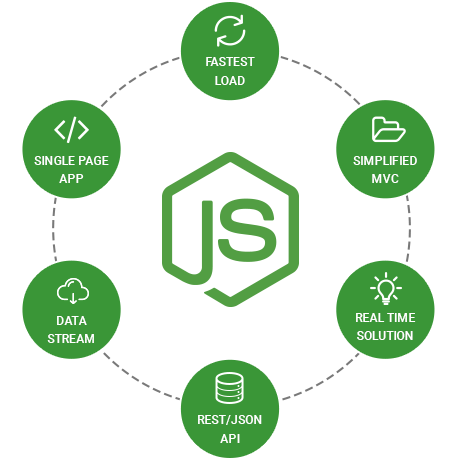Pulse of Information
Your source for the latest insights and updates.
Node.js: The Unsung Hero of Modern Web Development
Discover why Node.js is the game-changer in web development that you never knew you needed! Unleash its power today!
Why Node.js is Essential for Scalable Web Applications
Node.js has revolutionized web development by providing a robust platform for building scalable web applications. One of its key features is the non-blocking I/O model, which allows it to handle multiple requests simultaneously. This makes Node.js particularly effective for applications that require high concurrency. The event-driven architecture optimizes performance, enabling developers to easily manage a large number of connections without sacrificing efficiency. In summary, Node.js efficiently handles asynchronous operations, making it an ideal choice for real-time applications such as messaging services and online gaming.
Moreover, the ecosystem surrounding Node.js is rich with libraries and frameworks such as Express.js and Socket.io, which accelerate the development process. These tools provide pre-built functionalities that can be customized to meet specific needs, further enhancing the scalability of web applications. Additionally, the use of a single programming language, JavaScript, both on the client and server sides streamlines the development workflow and reduces the learning curve for developers. Ultimately, leveraging Node.js for scalable web applications not only boosts performance but also simplifies the development process, making it an essential choice for modern web solutions.

Understanding Asynchronous Programming in Node.js
Asynchronous programming is a fundamental concept in Node.js that allows developers to execute multiple tasks concurrently without blocking the main thread. This is particularly important in a server environment, where handling multiple client requests efficiently is crucial for performance. In Node.js, events and callbacks are at the heart of asynchronous programming. When a function is called, it can initiate tasks that will run independently. Once these tasks complete, a callback function is triggered to handle the result. This mechanism helps maintain a responsive server that can handle numerous requests simultaneously.
Node.js utilizes the event loop to facilitate asynchronous operations. The event loop is a single-threaded mechanism that manages the execution of asynchronous code. When a non-blocking operation is initiated, it is sent to the event loop, which continues to process other code while waiting for the operation to complete. Once the operation finishes, the result is queued for processing. This allows Node.js to manage high levels of concurrency with minimal overhead. By understanding and leveraging asynchronous programming, developers can build fast, efficient, and scalable applications in Node.js.
10 Reasons Why Node.js is the Backbone of Modern APIs
Node.js has rapidly emerged as the backbone of modern APIs due to its non-blocking, event-driven architecture. This allows developers to handle multiple requests concurrently, making applications not only scalable but also fast. With the ever-growing demand for real-time applications, Node.js supports WebSockets, enabling instantaneous two-way communication. As a result, businesses can provide a more interactive and engaging user experience, crucial in today's digital landscape.
Moreover, the vast ecosystem of Node.js modules and libraries available through npm (Node Package Manager) gives developers a powerful toolkit for building robust APIs. By leveraging existing solutions, they can significantly reduce development time and focus on delivering unique features that enhance their applications. These advantages, coupled with its ability to facilitate seamless integration with various databases and services, cement Node.js as an indispensable technology for modern API development.